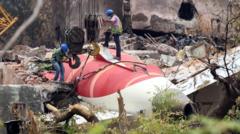Investigators have successfully retrieved the cockpit voice recorder (CVR) from the wreckage of the Air India flight that tragically crashed shortly after take-off, paving the way for a deeper understanding of the accident's causes. The Boeing 787-8 Dreamliner, which was en route to London, experienced catastrophic failures moments after departing from Ahmedabad, India, resulting in the deaths of at least 270 individuals, primarily passengers.
The CVR records critical cockpit audio, encompassing communications between pilots, alarms, and other ambient sounds. In tandem, the flight data recorder (FDR)—which retains essential flight data such as altitude, speed, and engine metrics—was recovered from the debris the day prior. Together, these pieces of equipment are referred to as the "black box," a crucial tool in air accident investigations, allowing experts to reconstruct the final moments of the flight and ascertain what led to the incident.
Contrary to its name, the "black box" consists of two bright orange devices designed for durability and visibility amidst wreckage. The investigation, led by India's Aircraft Accident Investigation Bureau (AAIB) with support from teams from the US and the UK, is expected to yield important insights. A statement released on Sunday confirmed that officials from the US National Transportation Safety Board (NTSB) have been surveying the crash site.
A high-level committee instituted by the Indian government to analyze the circumstances around the crash is set to convene its inaugural meeting soon, with plans to present a preliminary report and propose new standard operating procedures to enhance aviation safety within three months.
As the inquiry progresses, families of the victims are facing agonizing uncertainty. The AI171 flight met its fate less than a minute after leaving Sardar Vallabhbhai Patel International Airport, crashing into a residential area adjacent to a medical college. Out of 242 on board, only one survived. Officials are now working to determine the extent of ground casualties while slowly identifying the victims through DNA matching, a grueling process given the condition of the remains.
Over the past weekend, authorities reported that they had recovered 270 bodies from the crash site, with more than 90 identifiable through DNA analysis. Families are grieving, with some—including the family of former Gujarat Chief Minister Vijay Rupani—claiming their loved ones as authorities handle the identification process.
The emotional toll on the families continues to grow, with long wait times and hopes hanging heavily in the air. As Mistry Jignesh expressed while waiting for news of his niece, he worries that the identification process could take far longer than expected as the search for bodies remains ongoing. The frustration of uncertainty and the need for closure weighs heavily on all those affected by the tragedy.


















